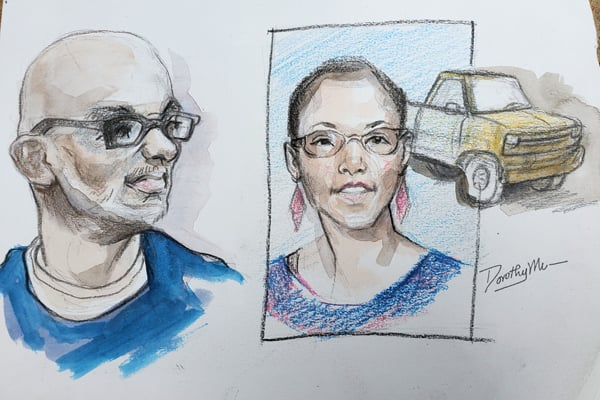Prosecutors reprimanded

A young woman, Noura Jackson, was in 2008 convicted by a court in Memphis, Tennessee in the USA for the murder of her mother, Jennifer Jackson. During the initial trial she was prosecuted by Amy Weirich of the Memphis prosecutor’s office.
Conviction overturned
The Tennessee Supreme Court, however, in August 2014, unanimously overturned her conviction because the prosecutor failed to disclose vital evidence to Noura’s lawyer during the trial.
The Supreme Court also ruled that the prosecutor acted improperly when she directly confronted Noura during the trial demanding her to tell court where she was at the time her mother was murdered. Soon after the Supreme Court ruling, Weirich announced that she would retry the case.
Retrying the case
Even after her conviction was overturned, Noura was still charged with murder. A new prosecutor, given the case, offered her a deal; a reduced sentence if she pleaded guilty to manslaughter. She was told that she had enough credits for good behavior and for working in prison to be released the same day if she pleaded guilty to manslaughter.
Plea bargain
On May 20, 2015, Noura was taken to a courtroom where she signed a plea bargain that her lawyers had negotiated. A few days after signing the plea bargain, Noura learned that, in fact, she did not have enough credits for immediate release; she had more than a year left to serve.
On Sunday August 7, 2016, Noura, aged 29, was released, after spending more than a decade in prison. The plea bargain allowed her to go home completely free, not on probation and not on parole, having completed her term.
Censuring prosecutors
The Tennessee Board of Professional Responsibility recommended that Amy Weirich and Stephen Jones, the other prosecutor in the case, be censured for failing to disclose that important evidence to Noura’s lawyer.
The prosecutors opted to stand trial instead. Jones was not found guilty and the Board agreed to dismiss charges against Weirich in exchange for a private reprimand.
One prosecutor observed that the results of withholding evidence have been tragic and unfair. To this particular prosecutor it is unjust to put defendants in a position where their lawyer cannot protect them from injustice for the simple reason that the lawyer does not know what the state has. This, and other cases, brought to light unethical practices by prosecutors, especially those who seek to get convictions at all costs.
Challenges
Some prosecutors have been frank and acknowledged that there are have been challenges in the way some of their colleagues carry out their work. One prosecutor went as far as saying “My job is about doing justice and that does not mean winning convictions all the time”. The prosecutor also noted that omitted evidence is a major reason for wrongful convictions and for people taking pleas they should not have. Prosecutors have, as a result, started pushing for accountability in their own offices.
Open-file policy
Some reform-minded prosecutors have adopted a policy called the open file policy. Instead of deciding which evidence is favourable and material to their case, prosecutors are required to hand nearly everything in their files to defense lawyers so that the defense lawyers can review the evidence for themselves, except for sensitive information that can put a witness at risk. One prosecutor confessed that prosecutors too can be biased and get so convinced that the defendant is guilty. To him prosecutors cannot be the architects of deciding what is helpful to the defense and what is not.
Broad disclosure must take place long before trial to be meaningful and to avoid trial by ambush. The open-file policy can lead to plea bargains when defense lawyers know that they have no chance of winning a case and they advise their clients accordingly.
The open-file policy, on its own, however does no ensure that the criminal justice system will be fair. The investigating team may zero on one suspect while ignoring other evidence and such ignored evidence may therefore not be on the file. Overloaded defense lawyers may also fail to take advantage of the leads that the state makes available. Nevertheless the open-file policy has apparently worked very well. In truth, in many cases, the consequence for withholding evidence is relatively minor.
A prosecutor who shared an office with Weirich and had read Noura’s file said, on record, that he would not have presented the case to the grand jury for indictment; to him the evidence was too thin. He would not have prosecuted the case based on the standards he had been taught. Based on this, the Innocence Project agreed to exonerate and prove Noura’s innocence using advancements in DNA use to actually determine who killed her mother.
On October 3, 2018, Horace Roberts, a 60 year old black man, was released from a California prison after DNA evidence exonerated him in the 1998 killing of his former girlfriend and co-worker, thanks to the Innocence Project. In 1999, Mr Roberts was found guilty of second degree murder and sentenced to life imprisonment in the killing of a co-worker with whom he had been having an affair. He initially lied about the relationship when she was found strangled near a deserted stretch of road. Her body was discovered about a mile away from Mr. Robert’s truck, which she often borrowed.




